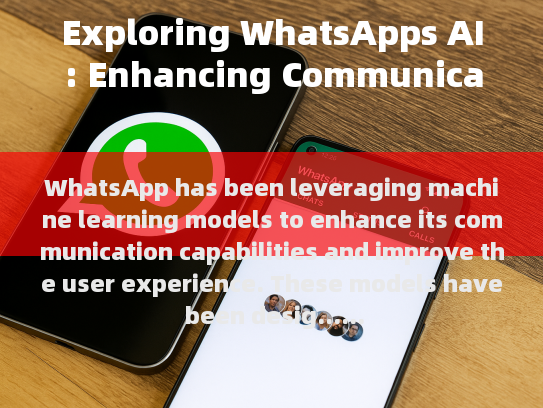WhatsApp has been incorporating artificial intelligence (AI) into its messaging platform to enhance user experiences and improve communication efficiency. Through the use of machine learning algorithms, WhatsApp is able to analyze conversations in real-time, providing users with personalized suggestions and recommendations that can help them communicate more effectively.,For example, WhatsApp's AI-powered chatbots are designed to answer common questions and provide quick responses to urgent messages. Additionally, the platform uses natural language processing (NLP) technology to understand the nuances of human conversation, allowing users to engage in more meaningful exchanges.,Furthermore, WhatsApp's AI capabilities extend beyond just messaging. The platform also utilizes facial recognition technology to ensure security during video calls and integrates augmented reality features to create interactive virtual backgrounds for users' phone screens.,Overall, the integration of AI technologies within WhatsApp aims to make communication easier, faster, and more efficient, ultimately enhancing the overall experience for its users.
WhatsApp has been utilizing machine learning models to boost its communication capabilities and optimize the user experience. These models are meticulously designed to provide personalized recommendations and insights based on users' interactions within the app.
One of WhatsApp's most prominent ML-driven features is the capability to predict messages that users might send next. By analyzing patterns in past conversations, these models can suggest appropriate responses or actions in real-time. This not only streamlines communication but also personalizes the interaction between users.
Additionally, WhatsApp employs artificial intelligence (AI) for chatbot assistance, allowing users to obtain quick answers to their queries without having to manually navigate through multiple pages. Chatbots learn from user interactions over time to become more accurate at providing relevant information.
Moreover, WhatsApp employs natural language processing (NLP) to facilitate users in finding specific content within their chats. Users can search for mentions of particular people, topics, or keywords, making it simpler to locate important discussions or moments.
In summary, WhatsApp's machine learning models play a vital role in enhancing the communication experience by predicting future messages, assisting with inquiries, and improving content discovery. These advancements aim to make chatting more efficient and enjoyable for users worldwide.

WhatsApp Logo
In the rapidly evolving landscape of communication apps, WhatsApp stands out as a pioneer in user-centric design and seamless integration with machine learning (ML) technologies. This article delves into how WhatsApp utilizes ML models to enhance its core functionalities and improve the overall user experience.
The Birth of WhatsApp Machine Learning
WhatsApp’s journey into the realm of AI began with the development of its own custom machine learning model, designed to understand the nuances of human language and respond more effectively to users’ messages. Initially, this model focused on improving message recognition accuracy, enabling it to correctly interpret the meaning behind text-based conversations without requiring extensive manual training or tuning.
Over time, WhatsApp expanded its use of machine learning beyond basic text analysis to include natural language processing (NLP). NLP techniques allowed for the creation of intelligent chatbots that could converse fluently with humans, addressing a wide array of issues such as customer support inquiries and routine scheduling tasks.
One of the most significant applications of ML in WhatsApp is its ability to detect spam messages and unauthorized access attempts. By analyzing patterns in incoming communications, the app’s ML model can swiftly identify suspicious activity, ensuring only legitimate interactions remain active within the platform.
Improving User Experience through Personalization
Personalization is another key area where WhatsApp leverages machine learning. With each interaction, the app learns more about its users’ preferences and behaviors, allowing it to tailor content and recommendations specifically to individual users. For instance, if a user frequently interacts with a particular business, WhatsApp may suggest similar products or services in future messages, enhancing the relevance and engagement levels of these interactions.
Moreover, WhatsApp’s ML models enable the application of predictive analytics to anticipate user needs before they even express them. Through continuous monitoring of usage patterns and feedback from users, the app can recommend new features or updates that might otherwise go unnoticed, fostering a more proactive and adaptive interface.
Enhancing Security and Privacy
Safety remains a paramount concern when it comes to communication platforms like WhatsApp. To address this challenge, the app integrates robust security measures powered by advanced machine learning algorithms. These models analyze data patterns associated with potential threats, including phishing attacks, malware distribution, and insider threats, thereby providing real-time protection against harmful activities.
Additionally, WhatsApp’s ML technology continuously monitors user behavior across multiple devices, detecting any unusual patterns indicative of compromised accounts. In cases where security incidents occur, the app’s ML system facilitates quick identification and resolution, minimizing the risk of further damage.
Future Prospects for WhatsApp Machine Learning
As technology continues to advance, WhatsApp plans to integrate even more sophisticated ML models to further enhance its capabilities. One promising direction involves developing collaborative learning systems between different bots and agents within the app ecosystem. Such collaborations could lead to unprecedented levels of interactivity and personalized assistance, making WhatsApp not just an information hub but also a source of dynamic, contextually relevant solutions.
Another horizon for WhatsApp lies in the field of virtual reality (VR), where the company aims to leverage immersive experiences to create a fully integrated VR chat environment. By integrating VR technology with its existing messaging capabilities, WhatsApp could offer users an entirely new way to engage with their friends and colleagues, potentially revolutionizing social interaction in the digital age.
Conclusion
WhatsApp’s adoption of machine learning models represents a transformative shift in the way we communicate and interact with technology. From improving message recognition and personalization to enhancing security and offering innovative future prospects, the app has demonstrated remarkable adaptability and foresight. As users continue to rely on WhatsApp for everything from daily chats to professional collaboration, the continued integration of advanced ML technologies promises to elevate both functionality and user satisfaction.
本文链接:https://www.ccsng.com/news/post/36416.html
Artificial Intelligence (AI)WhatsApp Messaging SystemWhatsApp机器学习模型
